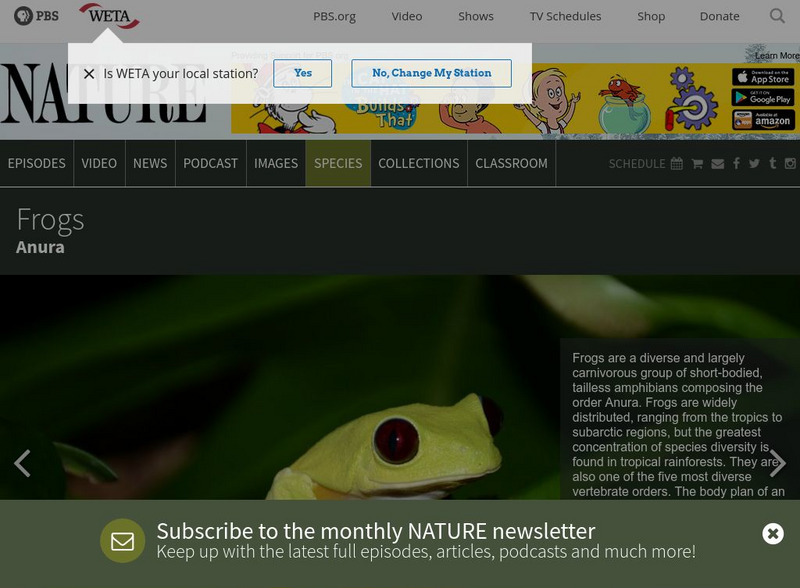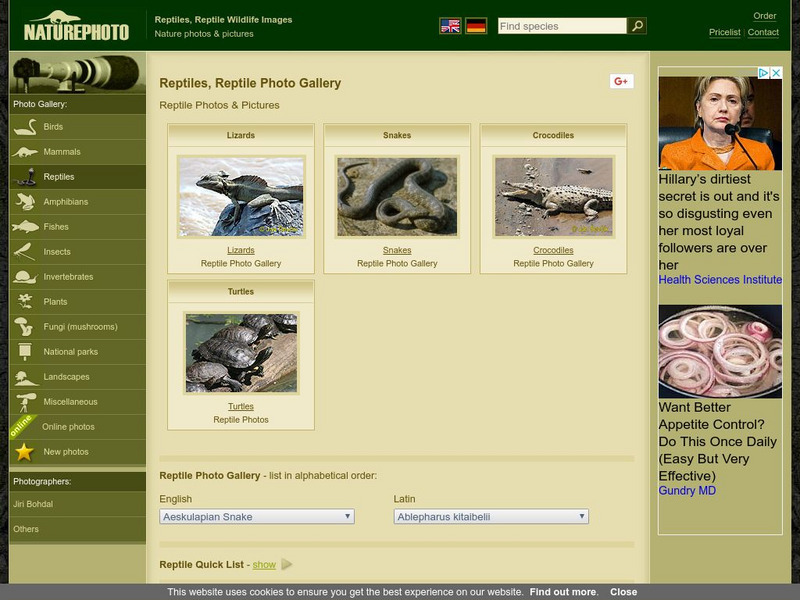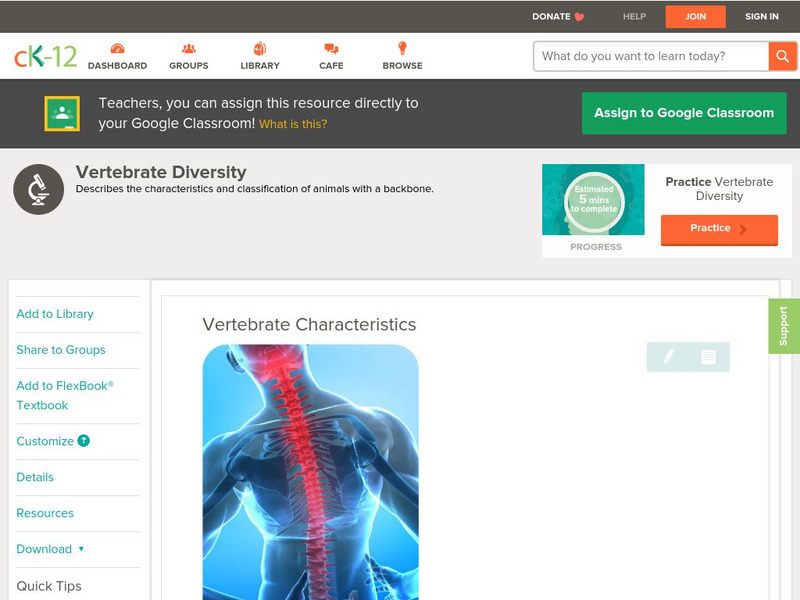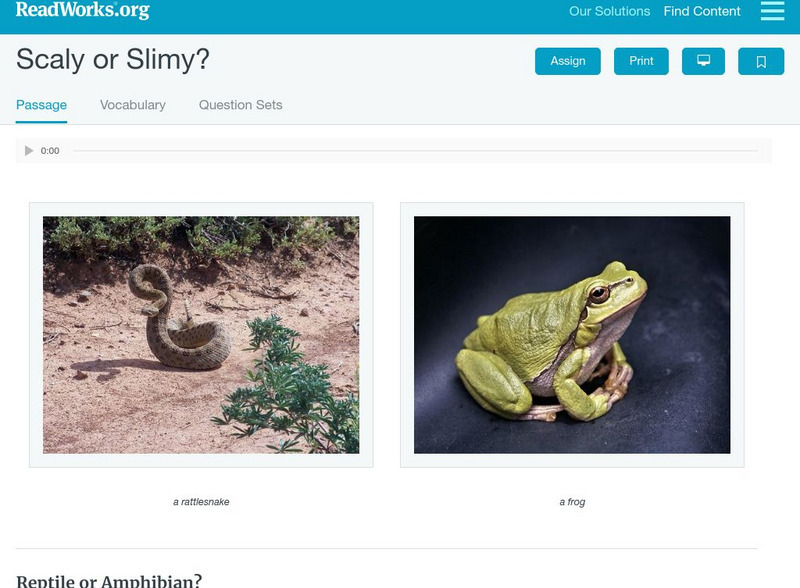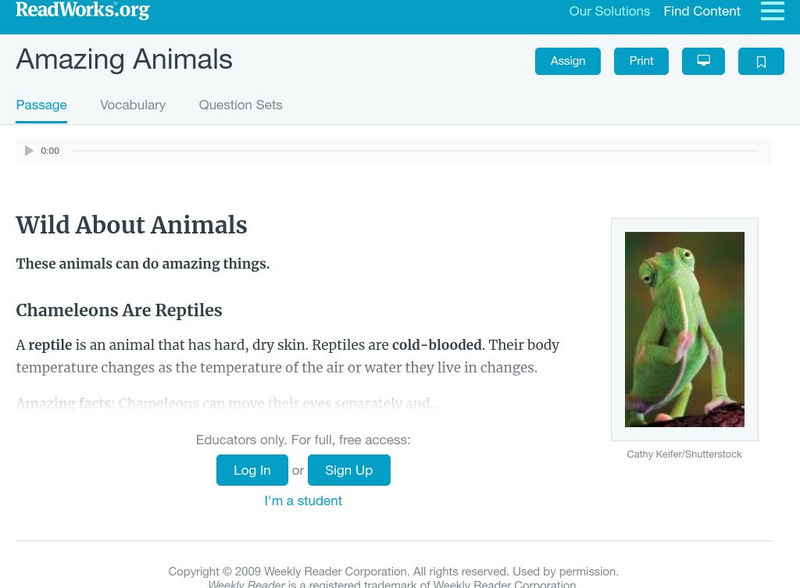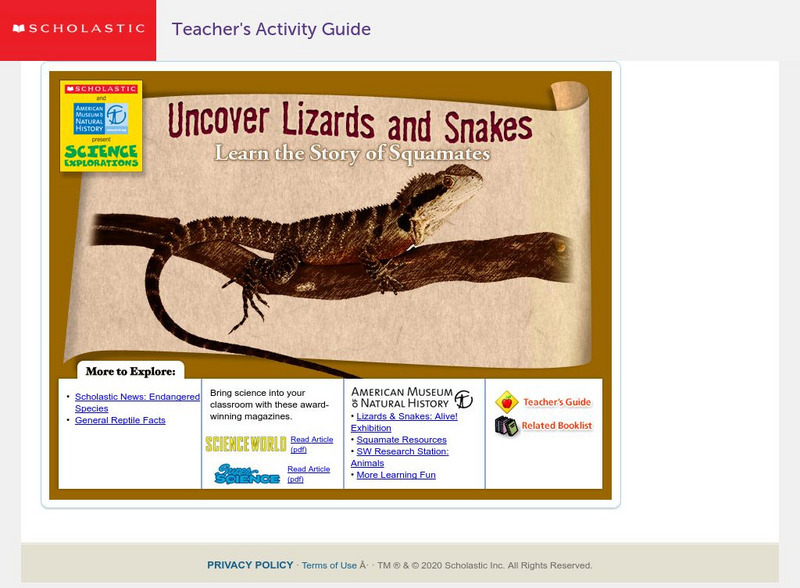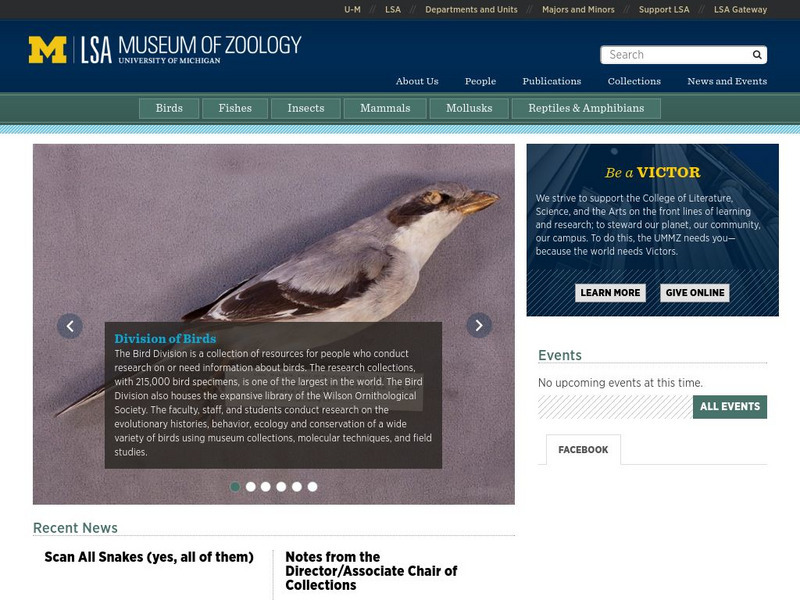Hi, what do you want to do?
Other
Science4 Us: Animals
In online and offline activities, students broaden their understanding of animals by learning to identify and classify animals into six categories: mammals, birds, fish, amphibians, reptiles, and invertebrates.
Biology 4 kids
Biology4 Kids: Traits of Reptiles
Check out the common traits of reptiles that sets them apart from amphibians.
PBS
Pbs Nature: Frogs and Toads
Do you know how to tell the difference between a frog and a toad? This site provides interesting facts and information about this type of amphibian from where they live to what they eat and more.
Biology Pages
Kimball's Biology Pages: Vertebrate Lungs
This personal page defines and compares the gas exchanges by the lungs of amphibians, reptiles, birds, and mammals. Offers detailed images.
ClassFlow
Class Flow: Reptiles and Amphibians
[Free Registration/Login Required] This flipchart provides basic information for the characteristics of reptiles and amphibian and life cycles. Videos show reptiles and amphibians that can cruise through the air, and an alligator mom...
Other
Amphibian and Reptile Conservation: Natterjack Toad
Description of the Natterjack Toad, including how to identify it, and its life cycle. It also provides a video [6:06] of an edition of the Living World with Lionel Kellaway, focussing on the natterjack chorus.
Other
Florida Department of Environmental Protection: Life in a Spring
Learn all about the diverse species that live in the Florida Springs. Separate sections for fish, reptiles and amphibians, birds and mammals, insects and invertebrates, and plants.
Curated OER
National Park Service: Arches National Park: Animals
A resource where you'll learn about amphibians, birds, mammals, and reptiles at Arches National Park in Moab, Utah. A good look at how animals live, sleep, eat, and stay active in a desert habitat.
University of Florida
Florida Museum of Natural History: Animals 1: Fur, Fins, Feathers, and More
This teacher's guide focuses on familiar animals such as mammals, birds, reptiles, amphibians, and fish.
Smithsonian Institution
Smithsonian National Zoo
Here is the National Zoological Park right at our fingertips. Students will find many things to explore at this colorful and engaging site. Any study of animals will have a successful start here. Chances are students can catch their...
CK-12 Foundation
Ck 12: Life Science: Vertebrate Characteristics
[Free Registration/Login may be required to access all resource tools.] Vertebrates are animals with backbones. These include fish, amphibians, reptiles, birds, and mammals. Learn more about vertebrate characteristics in this learning...
CK-12 Foundation
Ck 12: Life Science: Chordates
[Free Registration/Login may be required to access all resource tools.] Did you know that fish, amphibians, reptiles, birds, and mammals are all related? They are all chordates. Chordates are a group of animals that includes vertebrates,...
Soft Schools
Soft Schools: Animal Classification Game
Decide whether an animal is an amphibian, insect, mammal or reptile with this interactive classification game.
Read Works
Read Works: Scaly or Slimy?
[Free Registration/Login Required] An informational text about the difference between a reptile and an amphibian. A question sheet is available to help students build skills in reading comprehension.
Read Works
Read Works: Amazing Animals
[Free Registration/Login Required] This nonfiction passage discusses distinguishing features of mammals, reptiles, and amphibians. This passage is a stand-alone curricular piece that reinforces essential reading skills and strategies and...
Environmental Education for Kids
Eek!: Environmental Education for Kids
This site provides illustrations, descriptions, and species of amphibians, birds, fish, insects, invertebrates, mammals, reptiles, and endangered species.
Scholastic
Scholastic: Science Explorations: Uncover Lizards and Snakes
An exploration of squamates, or scaled reptiles. Take notes about lizards and snakes using the pdf "Squamate Chart" while viewing a slideshow, investigate the squamate anatomy and how squamates differ from other animals, such as insects...
Other
Asp Viper
A series of color photos of the Asp Viper from Amphibians and Reptiles of Europe. Link to related species photos.
ClassFlow
Class Flow: Vertebrates
[Free Registration/Login Required] This flipchart is about vertebrate animals. It contains information about the 5 types of vertebrates: fish, amphibians, reptiles, birds, and mammals. The flipchart contains links to websites and...
ClassFlow
Class Flow: Animal Classification
[Free Registration/Login Required] Students will classify organisms into groups and relate how they determined the groups with how and why scientists use classification. They will also demonstrate how animals are sorted into groups...
University of Florida
Florida Museum of Natural History: Homepage
This site from the Florida Museum of Natural History gives the current events, information about the museum, exhibits and public programs, research and collections, links, etc. to the Florida Museum of Natural History.
University of Michigan
University of Michigan: Museum of Zoology
See the Museum of Zoology where visitors can explore the museum's resources.
University of Florida
Flmnh: Crocodiles
The Florida Museum of Natural History provides photographs of alligators, caimans, crocodiles and charials can be used for reports and presentations as well as wildlife/reptile lesson plans.
Other popular searches
- Reptiles and Amphibians
- Reptiles Amphibians
- Amphibians and Reptiles K 2
- Reptiles & Amphibians
- Amphibians and Reptiles K
- Reptiles Amphibians Fish
- Compare Reptiles Amphibians
- Amphibians and Reptiles Prek
- Reptiles Amphibians Birds
- Amphibians and Reptiles Unit
- Amphibians and Reptiles Perk
- Amphibians and Reptiles 3 5







